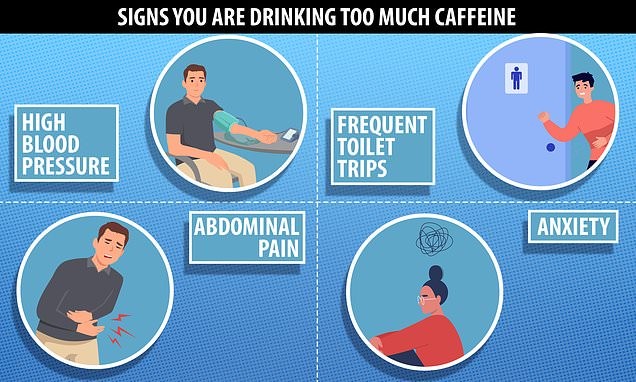
In the relentless hum of modern life, caffeine has undeniably become a pervasive and often indispensable companion. From the comforting aroma of a morning coffee to the sharp kick of an energy drink before a late-night deadline, this ubiquitous stimulant fuels our routines, sharpens our focus, and helps us navigate the demands of demanding schedules. For many, a moderate intake provides a welcome boost without discernible ill effects. However, like any powerful substance, caffeine comes with a threshold, a point at which its benefits give way to a cascade of unwelcome and often disruptive physiological responses. Understanding “your body on too much caffeine” is crucial for anyone who relies on this daily pick-me-up, as the line between beneficial stimulation and detrimental overstimulation can be surprisingly fine.
At its core, caffeine is a central nervous system stimulant. Its primary mechanism of action involves blocking adenosine, a neurotransmitter that promotes relaxation and sleepiness. By inhibiting adenosine, caffeine keeps us feeling alert and energized. In moderation, this can enhance cognitive function, improve reaction time, and even boost physical performance. However, when the intake escalates beyond what the body can comfortably process, this intricate system goes into overdrive, leading to a range of noticeable and often unpleasant symptoms.
One of the most immediate and commonly recognized signs of excessive caffeine consumption is an elevated heart rate and palpitations. For sensitive individuals, even a slightly higher dose can trigger a sensation of their heart pounding or skipping beats. This occurs because caffeine directly stimulates the cardiovascular system, increasing heart rate and blood pressure. While generally not dangerous for healthy individuals, this can be concerning and uncomfortable, and for those with pre-existing heart conditions, it can pose more significant risks. Accompanying this cardiac acceleration might be a general sense of restlessness or jitters, making it difficult to sit still or concentrate. The very focus caffeine aims to provide can be undermined by an overwhelming feeling of anxious energy.
Beyond the cardiovascular system, too much caffeine can wreak havoc on the nervous system, manifesting as heightened anxiety, nervousness, and even full-blown panic attacks in susceptible individuals. This is often attributed to caffeine’s ability to increase levels of stress hormones like cortisol and adrenaline. While a minor surge can be invigorating, a sustained or excessive release can mimic the body’s “fight or flight” response, leading to a state of hyper-arousal, irritability, and a profound inability to relax. The very stimulant that promised productivity can transform into a source of debilitating unease, making it difficult to sleep, leading to a vicious cycle where more caffeine is consumed to combat the fatigue caused by poor sleep.
Sleep disruption is, in fact, one of the most common and detrimental effects of excessive caffeine intake, particularly when consumed later in the day. The half-life of caffeine, meaning the time it takes for half of the substance to be eliminated from your system, can range from 2.5 to 4.5 hours, or even longer for some individuals. This means that a late afternoon coffee can still be actively circulating in your system well into the night, delaying sleep onset, reducing sleep quality, and shortening total sleep time. Chronic sleep deprivation, in turn, has a cascade of negative health consequences, including impaired cognitive function, mood disturbances, weakened immune response, and an increased risk of various chronic diseases. The temporary energy boost comes at the long-term expense of restorative rest.
The digestive system also bears the brunt of caffeine overload. Caffeine is a known diuretic, meaning it increases urine production, potentially leading to dehydration if fluid intake isn’t adequately managed. Furthermore, it stimulates gut motility, which for some, can result in an upset stomach, heartburn, or even diarrhea. The acidity of coffee, in particular, can exacerbate acid reflux symptoms, causing discomfort and indigestion.
Headaches are another common symptom of both caffeine withdrawal and overconsumption. While caffeine can sometimes alleviate tension headaches, an excess can ironically trigger or worsen them. The precise mechanism isn’t fully understood, but it’s believed to be related to caffeine’s effects on blood vessels in the brain. Similarly, muscle tremors or twitching, particularly in the eyelids, can be an uncomfortable, albeit usually harmless, sign that your system is overloaded.
Identifying your personal caffeine limit is key. While official guidelines often suggest up to 400 milligrams per day (roughly four cups of coffee) as safe for most healthy adults, individual tolerance varies wildly based on genetics, body weight, liver function, and existing health conditions. Pay attention to your body’s signals: the jitters, the racing heart, the heightened anxiety, the disturbed sleep. These are not minor inconveniences; they are clear indicators that your system is struggling under the load.
In conclusion, while caffeine can be a valuable tool for boosting alertness and performance, its powerful effects demand respect and moderation. Understanding how your body reacts to too much caffeine—from cardiovascular and nervous system overstimulation to digestive upset and profound sleep disruption—is essential for responsible consumption. The aim is to find that sweet spot where you harness its benefits without succumbing to its drawbacks. Prioritizing rest, hydration, and mindful intake will ensure that your daily dose of caffeine remains a helpful ally, rather than a disruptive force, in your pursuit of well-being and productivity.